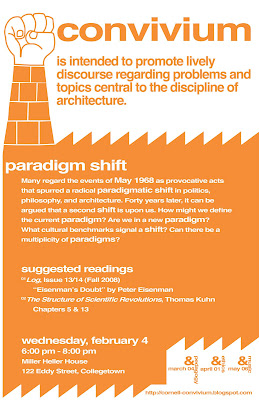08 November, 2009
Convivium 11.13.09 (topic)
CONVIVIUM is a salon-style gathering intended to promote lively discourse regarding problems and topics central to the discipline of architecture.
SESSION 2
FRIDAY, NOVEMBER 13
7:30 – 9:30 pm
Miller Heller House
122 Eddy Street, Collegetown
This semester, CONVIVIUM examines the question HOW IS ARCHITECTURE LOCATED? In so doing, we will explore the ways in which external conditions circumscribe the discipline, and come to bear on its epistemological, pedagogical, and practical modalities.
SESSION 2 will reconsider architecture’s pedagogical intentions in light of recent economic turmoil, shifts internal to the discipline, and outmoded institutional structures. We will begin by screening a TED talk by Liz Coleman, president of Bennington College in VT, who radically restructured the curriculum there and makes the case for a socially engaged and activist liberal arts education. Following this, Dagmar Richter, chair of the architecture department, will discuss some of her research and thinking on pedagogical models and methodologies. Our conversation will unfold into a careful and critical evaluation of learning today.
SUGGESTED READINGS
01 Studio Culture Policy (2009)
02 Redesign of Studio Culture: A Report of the AIAS Studio Culture Task Force (2002)
03 Prosthetic Theory: The Disciplining of Architecture (Mark Wigley, Assemblage, 1991)
http://www.cornell-convivium.blogspot.com/
07 October, 2009
05 October, 2009
06 May, 2009
music prep
MUSIC
Many have taken note of the relationship between music and architecture. Goethe made the claim that “architecture is frozen music”, and certainly the two disciplines share a common parlance at times. For decades, artists, architects, and musicians have tested the ways in which sound can be spatialized, music visualized, and place translated into composition. Through presentations and performances, we will look at some examples of this work in order to examine the various ways in which these two disciplines overlap.
SUGGESTED LISTENING
01 Musical Language, Radiolab. (Season 2, episode 1)
http://www.wnyc.org/shows/radiolab/episodes/2006/04/21
02 Poeme Electronique, Edgard Verese.
http://www.medienkunstnetz.de/refmovie.php?mov=7&play=audio
03 Metastasis, Iannis Xenakis
http://www.youtube.com/watch?v=n2O8bMlEijg&feature=related
04 Prometheus: Poem of Fire, Alexander Scriabin
http://www.youtube.com/watch?v=iG1x_c9CrWA&feature=related
05 Excerpt from Villa Medici Walk, Janet Cardiff and George Bures Miller. (Featured in the
compilation “Headphones: Sound Without Space” on AAIR.FM)
http://www.aair.fm/2009/04/18/13-cardiff-janet-with-george-bures-miller-villa-medici-walk-2001-%E2%80%93-excerpt/
14 April, 2009
like minds...
there was a recent event hosted (barbican debate) on ethics, a summary article: http://www.treehugger.com/files/2009/04/cameron-sinclair-barbican-debate.php and an article by one of the main organizers cameron sinclair, co- founder of architecture for humanity http://www.huffingtonpost.com/cameron-sinclair/the-architects-dilemma-th_b_185031.html
07 April, 2009
other links of interest:
http://speakingoffaith.publicradio.org/programs/ruralstudio/
http://www.ted.com/index.php/talks/cameron_sinclair_on_open_source_architecture.html
http://www.wnyc.org/shows/radiolab/episodes/2006/04/28
ethics prep
ETHICS
As students of architecture, our positions on history, technology, materiality, usership, and epistemology come to dictate our particular style and practice. Within the act of translation from idea into building, these positions become political. Given the inherently social character of our discipline, what are the ethical implications of this mode of production? What does it mean to be ethical? How are architects ethical (or not) at the level of design? How can architects be more ethical – should they be?
SUGGESTED READINGS
01 Inmediasres, David Bell. (VIA 10: Ethics and Architecture)
* please post/email if you would like a pdf of this article! (not able to attach it here)
02 “Famine, Affluence, and Morality”, Peter Singer. (Philosophy and Public Affairs, vol. 1, no. 1)
http://www.utilitarian.net/singer/by/1972----.htm
02 March, 2009
01 March, 2009
Convivium 1 discussion
Some
things
we
discussed
What is paradigm?
How do we define it for our discipline?
How does that differ from other disciplines?
Is there a shift?
What does E. not say in his article?
Can we begin to define paradigm?
Do other professions use the term paradigm?
What is Kuhn’s definition of paradigm?
Is the paradigm over or under?
Cognizant or underlying? Inherent or intentional?
How does paradigm differ from pedagogy?
Paradigm vs. zeitgeist/fad?
Are fads limited?
Is the paradigm defined by the theorist/historian? Technology?
Can a paradigm shift be contained within one field?
What is the metaphysical project?
What is the current paradigm?
What catalyzes a paradigm shift?
Could architecture be at the forefront of paradigm if it were more interdisciplinary?
What are the limits of the medium?
Is Kuhn’s talk of paradigmatic shift a function his own culture of expertise?
Is he producing himself as a scientific historian/expert?
Is there such a thing as a paradigm shift?
Is this a correct way of understanding how change really occurs?
We are all accepting that a paradigm shift occurred in 1968, perhaps it did not?
How did we arrive at believing there was a paradigm shift in 1968?
What was the paradigm pre-1968?
What is the paradigm now?
Is there one paradigm?
Are there multiple paradigms?
Is any knowledge system totalizing?
How can you know whether it has changed?
What are the frames of interpretation that structure the discipline of architecture?
If one accepts the paradigmatic way of looking at the world, why is that helpful?
Accepting E.’s viewpoint, what is the paradigm he is speaking about?
What is the metaphysics of presence?
What the hell is the metaphysics of presence?
What is presence?
What is metaphysics of presence?
Does speciation prevent a paradigmatic shift?
Will synthesis/unification of the field promote a paradigm shift?
How much should the way we work be guided by a system of belief?
Why must architecture be coupled with philosophy?
What do we do if we abandon the notion of progress?
What is progress?
What is architecture?
Do we associate too many things with the paradigm?
Do multiple paradigms negate the notion of a paradigm?
What practitioners/cultural markers tell of a paradigm shift that happened, is happening, or will happen?
Is it only the historian/theorist that identifies the paradigm shift?
Is the question of paradigm a problem of semantics or a problem in thinking?
02 February, 2009
Subscribe to:
Comments (Atom)






